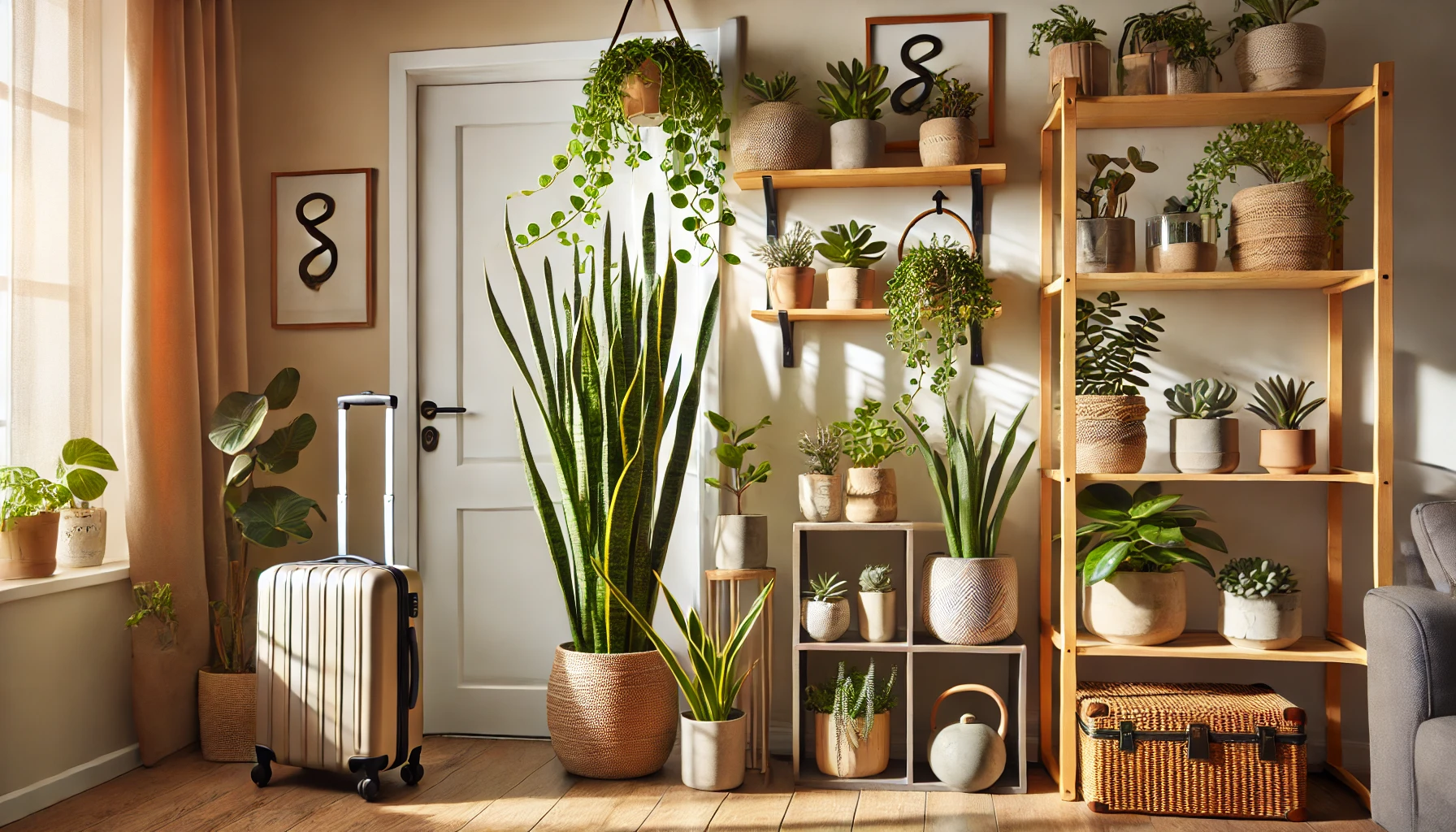When you’re often away, selecting hardy plants that thrive with minimal care is essential. Here are some of the best options:
Snake Plant (Sansevieria):
Why it’s ideal: Virtually indestructible, the snake plant tolerates neglect, low light, and irregular watering.
Care needs: Water every 2-3 weeks and allow the soil to dry completely between waterings.
Bonus:
It’s an excellent air purifier, making it great for your home’s atmosphere.
ZZ Plant (Zamioculcas zamiifolia):
Why it’s ideal:
Extremely drought-tolerant and low-maintenance, the ZZ plant thrives in low to moderate light conditions.
Care needs:
Water once a month or less, and avoid overwatering.
Bonus:
Its dark, glossy leaves add a touch of elegance to any room.
Succulents:
Why they’re ideal:
Succulents like Echeveria, Haworthia, or Jade Plant store water in their leaves, requiring very little attention.
Care needs:
Water moderately, about once every 3-4 weeks, and ensure they get plenty of indirect sunlight.
Bonus:
Perfect for small spaces, they come in a variety of shapes and colors.
Cacti:
Why they’re ideal:
Native to arid climates, cacti can go weeks without water.
Care needs:
Water only when the soil is completely dry, typically every 4-6 weeks.
Bonus:
Their unique shapes make them a striking addition to your decor.
Pothos (Epipremnum aureum):
Why it’s ideal:
Often called “Devil’s Ivy,” Pothos is nearly impossible to kill and thrives in a variety of conditions.
Care needs:
Water every 1-2 weeks, allowing the soil to dry between waterings.
Bonus:
Its trailing vines can add a lovely cascading effect to shelves or hanging pots.
Cast Iron Plant (Aspidistra elatior):
Why it’s ideal:
Known for its durability, the cast iron plant tolerates low light, neglect, and infrequent watering.
Care needs:
Water every 2-3 weeks and keep it under indirect light.
Bonus:
Its dark green foliage is timeless and complements any decor style.
Rubber Plant (Ficus elastica):
Why it’s ideal:
Hardy and tolerant, the rubber plant requires minimal watering and care.
Care needs:
Water every 1-2 weeks and occasionally wipe the leaves to remove dust.
Bonus:
Its large, glossy leaves draw attention in any space.
Peace Lily (Spathiphyllum):
Why it’s ideal:
Although it prefers constant care, the peace lily can survive for weeks without water, quickly recovering when hydrated.
Care needs:
Water every 1-2 weeks or when the leaves begin to droop slightly.
Bonus:
It produces beautiful white flowers and purifies the air.
Philodendron:
Why it’s ideal:
With its ability to tolerate low light and infrequent watering, the philodendron is an excellent choice for travelers.
Care needs:
Water every 1-2 weeks and keep it under indirect light.
Bonus:
Its heart-shaped leaves make it an attractive indoor plant.
Dracaena:
Why it’s ideal:
Hardy and drought-tolerant, the Dracaena adapts well to indoor conditions.
Care needs:
Water every 2-3 weeks and avoid direct sunlight.
Bonus:
Its vertical growth makes it perfect for corners or smaller spaces.
Preparing Your Plants Before Traveling
To ensure your plants survive your trips, take a few proactive steps before leaving.
Tips for preparing your plants:
Water thoroughly:
Water your plants one or two days before leaving to give the soil enough time to absorb moisture.
Group the plants together:
Place plants close to each other to create a microclimate that retains moisture.
Use self-watering pots:
Invest in pots with built-in reservoirs that release water slowly over time.
Apply mulch to the soil:
Add a layer of mulch or pebbles on top of the soil to reduce evaporation.
Move plants away from direct sunlight:
Place plants in a location with indirect light to avoid excessive drying.
Consider plant sitters:
If you’re away for an extended period, ask a friend or neighbor to check on your plants.
Proper preparation ensures your plants stay healthy while you’re away.
Low-Maintenance Plant Care Systems
For those who travel often, investing in automated plant care systems can make life easier.
Self-watering systems:
Self-watering pots:
Designed with reservoirs that keep the soil moist for weeks.
Water globes:
Glass or plastic bulbs that release water slowly into the soil.
Irrigation systems:
Use drip irrigation kits with timers to provide consistent watering for multiple plants.
DIY watering tips:
Plastic bottle droppers:
Fill a plastic bottle with water, make small holes in the cap, and insert it into the soil.
Absorption systems:
Place a water-filled container near the plant and use a cotton string to transfer water to the soil.
Automated systems simplify care and provide peace of mind during extended absences.
Creating a Resilient Green Space
Designing a green space suited to your lifestyle can make plant care easy and enjoyable.
Styling tips for resilient plants:
Group hardy plants:
Create a cohesive look by organizing snake plants, ZZ plants, and cacti in matching pots.
Use vertical space:
Hang trailing plants like Pothos or Philodendron in macrame pots to save floor space.
Mix textures and sizes:
Combine large-leafed plants like rubber plants with compact succulents for variety.
Add decorative touches:
Use pebbles, moss, or stylish pots to enhance your plant display.
A well-designed green space enhances the aesthetics of your apartment and requires minimal upkeep.
Benefits of Resilient Plants for Travelers
Low-maintenance plants offer more than just convenience—they also contribute to a healthier, happier home.
Why resilient plants are perfect for busy lifestyles:
Stress reduction:
Coming home to plenty of greenery helps you relax after a trip.
Air quality improvement:
Many resilient plants purify the air and add oxygen to your home.
Aesthetic appeal:
Plants like snake plants and rubber plants add a sophisticated touch to your decor.
Resilient plants allow you to enjoy the benefits of greenery without the stress of constant care.
Thriving Plants for Frequent Travelers
Having a green thumb doesn’t have to conflict with a busy travel schedule. By choosing resilient plants like Snake Plants, ZZ Plants, and Pothos, and implementing practical care solutions, you can enjoy a thriving indoor garden no matter how often you’re away. With a little planning and the right tools, your plants will greet you at home with their lush and vibrant beauty.

